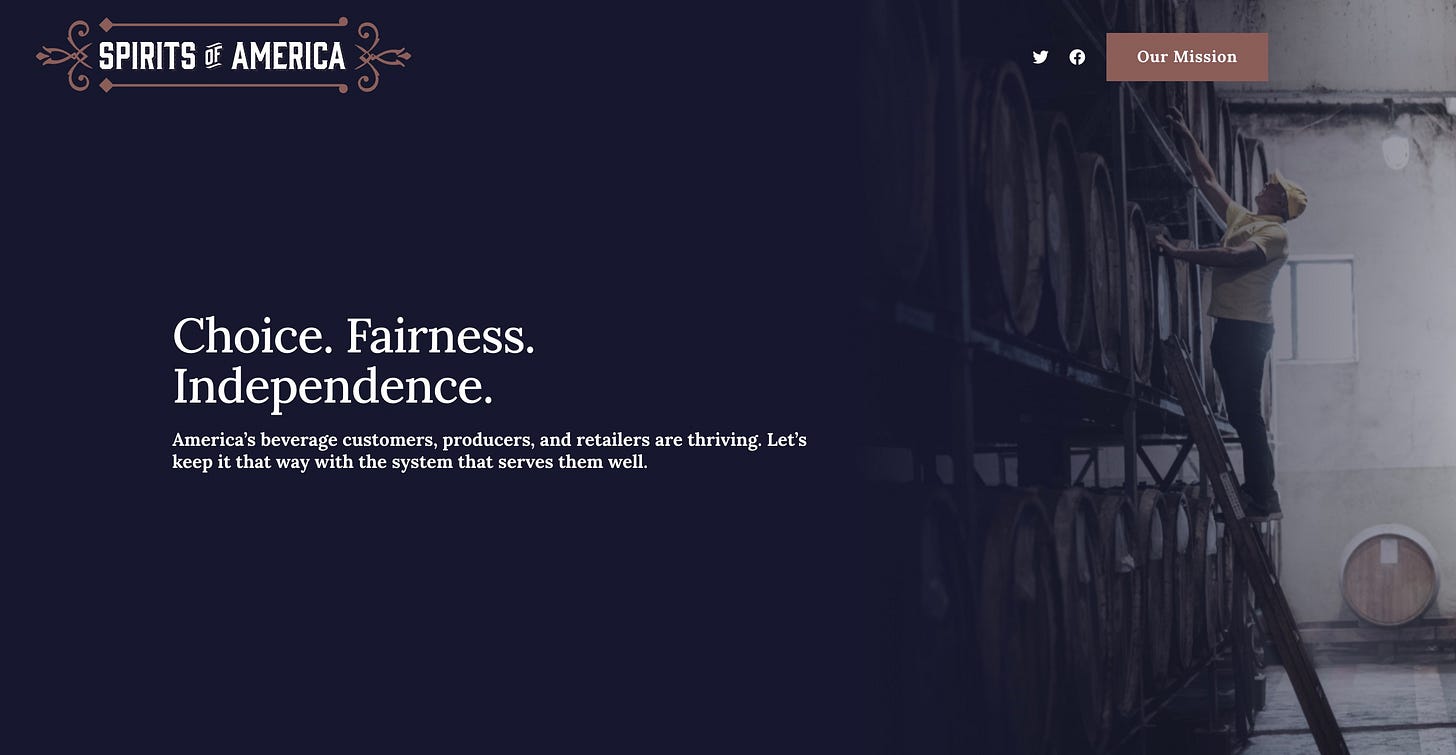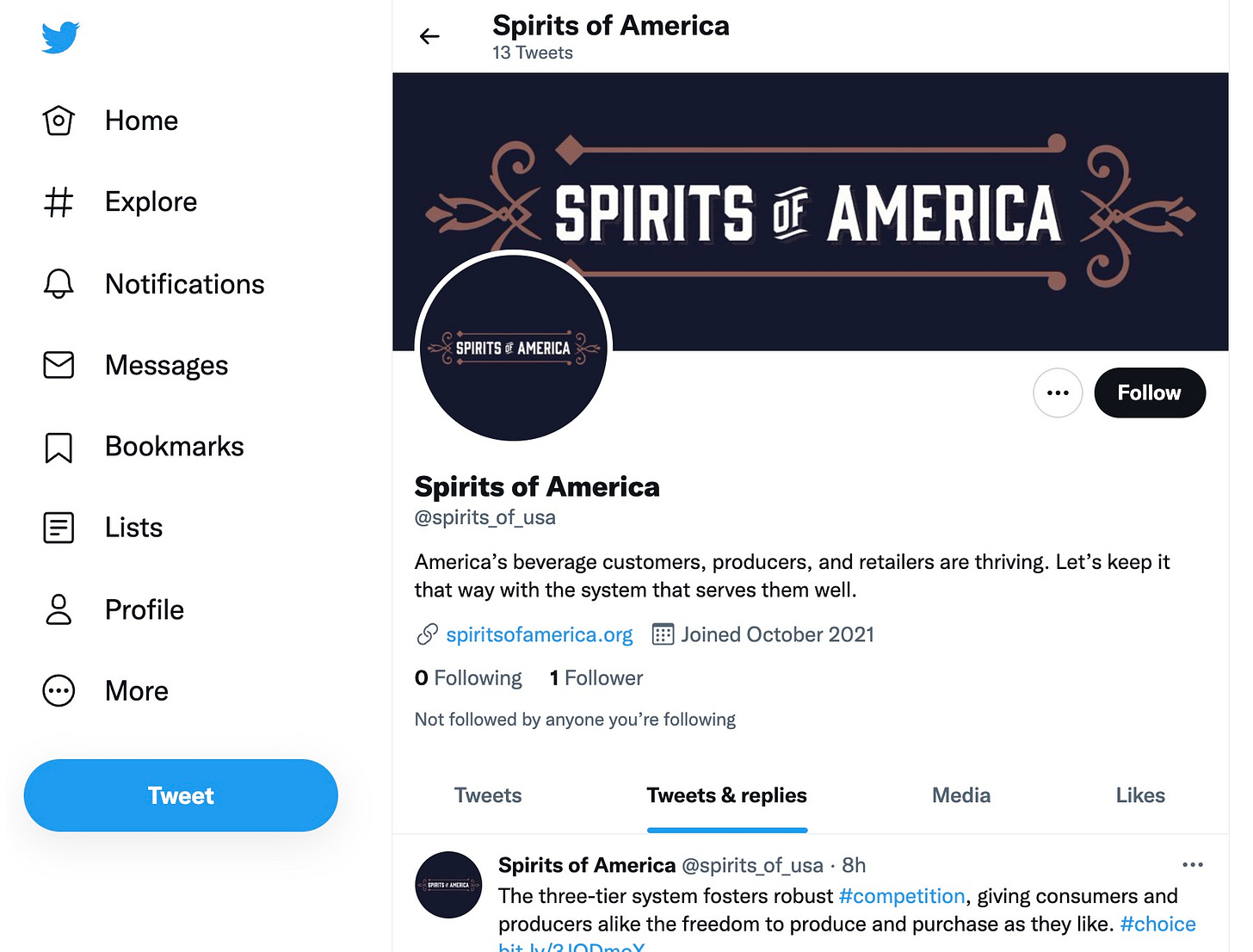The Anonymous Three Tier System
Why keep your name off of a website unless you are embarrassed or seek to deceive?
Why would advocates of a hard and fast three-tier system of alcohol distribution create a website, a Twitter feed and a Facebook page to argue for the efficacy of that system, but not disclose who created those tools? Why would they go out of their way to hide and mask who is behind this effort?
If I was one of those people who always jumped to the least charitable interpretations of events, I’d say this kind of thing was done in order to deceive those who found their way to the website, Twitter feed or Facebook page. But I’m not that kind of person. So, instead, I will deliver a more charitable interpretation and say the Wine & Spirit Wholesalers of America have hidden their involvement in the creation of the “Spirits of America” communications campaign primarily because they are a bit embarrassed by the blatant lies they are telling through this campaign.
First things first. This brand new “Spirits of America” website along with its Twitter Feed and Facebook page have the purpose of protecting the interests of America’s wine, beer, and spirits middlemen wholesalers against any repercussions from the Biden Administration’s July 2021 Executive Order that, among other things, directed an investigation into anti-competitive structures and impediments in the wine, beer and spirits industry.
I know this is the purpose of the Spirits of America website because within this very sparsely populated website there is an entire section devoted to attacking and undermining the Administration’s focus on competition within the alcohol beverage industry. That section is entitled Keeping Spirits Competitive and Consumer Friendly. On that page, the mysterious owners of the website state:
“The main emphasis of the executive order on competition was to examine consolidation in entirely unrelated industries like health care and technology. The time-tested Three-Tier System was unnecessarily included in the wide-ranging 72-initiative executive order.
Misinformation being circulated about the impact of the Three-Tier System on competition and access to the alcohol marketplace threatens to shape the Treasury report and future policymaking.”
The clarity of purpose behind this anonymous website revealed as it is here, is greatly appreciated.
By the way, the way I surmise, despite not a single ownership-identifying feature in the entire site that this anonymous website is operated, at least in part if not wholly, by the notorious Wine & Spirit Wholesalers of America—is by looking at its associated Twitter feed (@spirits_of_usa). There is a single follower of the page as of this writing. That follower is Alexandria (Ali) Prolago Gormley, the VP of Federal Affairs for the Wine & Spirit Wholesalers of America. If WSWA were going to create a website filled with lies in order to try to help influence the outcome of the Administration’s investigation into anti-competitiveness in the wine, beer and spirits industry, it would fall to Ms. Prolago Gormley in her role as WSWA’s chief federal lobbyist.
But I could be wrong. The anonymous site could be a collaboration among wholesalers. In the end, it’s the cowardliness that matters.
What’s equally notable about this anonymous advocacy site is the various ways in which it pitches lies concerning the alcohol beverage market in the United States. For example, these lies are particularly egregious:
“Thanks to robust competition [within the three-tier system] and the ability to partner with larger distributors and retailers, small businesses like craft breweries, boutique distillers, and small wineries have the opportunity to grow their business and sell their products independently and widely.”
“The Three-Tier System also ensures the alcohol supply chain has freedom from unreliable foreign markets, supporting home grown brands and protecting consumer safety and public health.”
“This system prevents monopolies from dominating the market and creates competition amongst manufacturers who provide consumers with an ever-expanding number of beer, wine, and spirit options at affordable prices.”
“The Three-Tier System offers consumers the choice between large national manufacturers and smaller boutique distilleries, wineries, and breweries, giving all producers the ability to compete and operate as they like.”
A few things need to be noted in response to such blatant lies. First, one has to wonder why America’s wholesalers and their representatives feel the need to lie about the U.S. alcohol beverage market and the three-tier system. I think I know why. If they told the truth about this 80+-year-old idea for regulating alcohol, it wouldn’t look good.
Only because it is actually never mentioned on the website that seeks to defend the three-tier system, let me remind you exactly what the “three-tier system” is. It is a means of distributing alcohol where producers who desire to see their products show up on a state’s retail shelves or in restaurants, must sell their products to a state wholesaler at half the product’s suggested retail price. In turn, the state’s retailers and restaurants are restricted by law to only purchase their inventory from those same wholesalers.
The most important aspect of this “system” is that wholesalers decide which brands may be sold at retail in the state. Retailers may not bypass the wholesaler and go straight to a producer somewhere in the country or directly to an importer and purchase products directly from them. The wholesaler is the gatekeeper.
This puts the lie to the claim that the three-tier system in any way promotes competition. In fact, the three-tier system is uniquely designed to suppress competition and create a quasi-monopoly for state wholesalers.
If you have not read Kathleen Wilcox’s recent “Wineries Success in the Face of Mass Consolidations, Shutdowns” I suggest you do so. In this bright and insightful article Ms. Wilcox notes that today two multi-state wholesalers control over 50% of the wine market in the U.S. In setting up her article on how wine brands are having to get innovative in how they sell their wines she notes that, “With fewer distributors, it seems inevitable that the biggest brands—the easy-to-move household names—will thrive, as smaller brands suffer.”
This is of course true. More importantly, the WSWA and other large wholesalers understand perfectly that if the Feds, in carrying out the Biden executive order on competition, take even a cursory look at the American alcohol beverage landscape and do so with an eye on anti-competitive structures, they will immediately notice the exceedingly anti-competitive nature of the three-tier system and the wholesalers’ place in the middle of that system.
It’s this realization that not only motivated the creation of the Spirits of America website but also led to the creation of the final page on that website entitled, “What Are They Saying About Competition.” This page holds the written comments of wholesalers made to the Feds in response to the executive order on competition. It also holds the single largest lie on a website that is primarily made up of lies:
“The resulting regulatory structure uniquely guards against anticompetitive forces that may exist in other industries. Our dynamic, diverse, competitive and inclusive Three-Tier System strikes a healthy balance among societal, governmental and commercial needs. BevAlc products are a special category of consumer goods and are regulated for good reason. We caution the Federal Government on deregulating the industry and increasing the risk for a return of tied-house and consumption abuse.”
—Southern Glazers Wine & Spirits
The threat that “deregulation” would bring about a return of the tied houses that existed in the early 20th century and overconsumption is laughable. I say this because there are two primary types of reform that, if they came to every state in the nation, would immediately revitalize the U.S. alcohol beverage marketplace, instill real competition and give a significant commercial boost to the vast majority of producers of beer, wine and spirits:
Assure that all wineries, distillers, brewers and retailers may ship wine directly to consumers across state lines
Allow wineries, distillers, and brewers to sell directly to retailers and restaurants in every state, bypassing the wholesale tier.
That’s it. Right there. Those two things would clean up the vast amount of corruption and anti-competitive qualities of the old and stale three-tier system.
And here’s the best part. If those two reforms were carried out across the country, the real beneficiaries would be consumers, who would have access to tens of thousands if not hundreds of thousands of more products than they currently have access to under the state-mandated three-tier system.
On a final note, I’m disappointed with WSWA. By refusing to put their name on the Spirits of America website, they end up lurking in the shadows like a poor old drunk not wanting to be noticed as they soil themselves when instead they could embrace the sunshine and defend their lies in public. Maybe they’ll choose the latter at some point. But for now, all we have are the words of an “anonymous” set of cowards.





